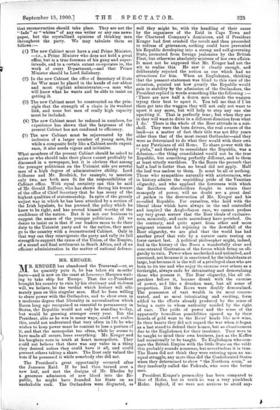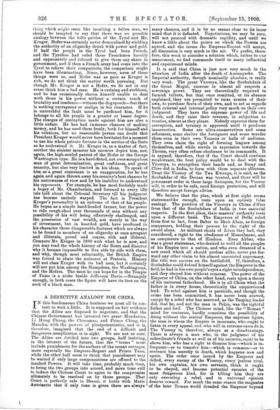MR. KRUGER.
MR. KRUGER has abandoned the Transvaal—or, as he quaintly puts it, he has taken six months' leave—and is now on the coast at Lourenco Marques wait- ing to take ship for Europe. That the ex-President brought his country to ruin by his obstinacy and violence will, we believe, be the verdict which history will ulti- mately pass on this singular man. Had he been willing to share power with the Outlanders, and to show even in a moderate degree that liberality in naturalisation which Bacon long ago recognised as essential to permanency in States, the Republic would not only be standing to-day, but would be growing stronger every year. But the President, able as he was in many ways, could not realise this, could not understand that very often in We he who wishes to keep power must be content to lose a portion cf it, and that the monopolist too often, while he seems to have made all secure, loses everything. Mr. Kruger and his burghers were in truth at heart monopolists. They cauld not believe that there was any value in a thing they desired unless they could have it all, and could prevent others taking a share. The Boer only valued the vote if he possessed it while somebody else did not.
The President's great opportunity occurred after the Jameson Raid. If he had then turned over a new leaf, and met the designs of Mr. Rhodes by a generous admission of new blood into the Re- public, he might have founded his State on an unshakable rock. The Outlanders were disgusted, as well they might be, with the handling of their cause by the organisers of the Raid in Cape Town and the Chartered Company's dominions, and if President Kruger had first crashed the revolt and than proceeded to redress of grievances, nothing could have prevented his Republic developing into a strong and self-governing State, protected from foreign jealousies by the British Fleet, but otherwise absolutely mistress of her own affairs. It must not be supposed that Mr. Kruger had not the wit to realise this. He saw it clearly enough, and deliberately rejected the notion as one which had no attractions for him. When an Englishman, thinking that the peasant-statesman was blind to this view of the situation, pointed out how greatly the Republic would gain in stability by the admission of the Outlanders, the President replied in words something like the following There are now half a dozen men outside the waggon trying their best to upset it. You tell me that if I let them get into the waggon they will not only not want to upset it any more, but will help to stop any one else upsetting it. That is perfectly true ; but when they are in they will want to drive in a, different direction from what I do.' There is the whole of the Boer attitude in a nut- shell. They were the born drivers, the real owners of the land—as a matter of fact their title was not fifty years older than that of the most recent Outlander—and they were as determined to do what they would with their own as any Patricians of old Rome. To share power with the " plebs," and thereby to consolidate the Republic, was a delusion,—the thing consolidated would not be the true Republic, but something perfectly different, and to them at least utterly worthless. To the Boers the proverb that half a loaf is better than no bread did not apply. Half the loaf was useless to them. It must be all or nothing. Those who sympathise naturally with aristocracies, who in history admire the unyielding pride of the Venetian oligarchy, and who applaud the fierceness with which the Southern slaveholders fought to retain their monopoly of power, will no doubt see a, great deal of pathos in the destruction of Mr. Kruger and his so-called Republic. For ourselves, who bold with the liberal ideas which have always in the end controlled and inspired the Anglo-Saxon race, we cannot profess any very great sorrow that the Boer ideals of exclusive- ness, monopoly, and caste ascendency have perished. On the contrary, and quite apart from other and more poignant reasons for rejoicing in the downfall of the Boer oligarchy, we are glad that the world has had another proof that rule by a narrow caste resting on force cannot last. A. political philosopher might, indeed, find in the history of the Boers a wonderfully clear and concentrated illustration of the forces which bring an oli- garchy to ruin. Power when unchecked and unlimited, and exercised, not because it is sanctioned by the inhabitants at large, but because it is the will of a privileged class who are born to its use and who enjoy its exercise over others as a birthright, always ends by intoxicating and demoralising those who possess it. The Boer oligarchy, like all oli- garchies before it, became drunk with the exercise of power, and like a drunken man, lost all sense of proportion. But the Boers were doubly demoralised. The possession of vast wealth in its most concen- trated, and so most intoxicating and exciting, form added to the effects already produced by the sense of being a caste in whom authority resided by the right of race. The pride of power and the sense of the apparently boundless possibilities opened up by their hoards of gold went to the Boers' heads like new wine. In their hearts they did not regard the war when it began as a last stand to defend their homes, but as chastisement due to the Englishmen for their insolence. They were to be taught to mind their own business, just as the Kaffirs had occasionally to be taught. To Englishmen who com- pare the British Empire with the little State on the veldt this probably sounds nonsense, but nevertheless it is true. The Boers did not think they were entering upon an un- equal struggle, any more than did the Confederated States when they determined to show " the Northern scum," as they insolently called the Federals, who were the better men.
President Kruger's personality has been compared to that of Hofer, but in truth he was a very pinchbeck Hofer. Indeed, if we were not anxious to avoid any. thing Tihich might seem like insulting a fallen man, we should be tempted to say that there was no possible analogy between the lofty patriot of the Tyrol and Mr. Kruger. Hofer was certainly never demoralised by wielding the authority of an oligarchy drunk with power and gold. If half the people in the Tyrol had been French, and the Tyrolese had ruled these Frenchmen harshly and oppressively and refused to give them any share in government, and if then a French army had come into the Tyrol to relieve their compatriots, the comparison might have been illuminating. Since, however, none of these things were so, and Hofer was as poor as Kruger is rich, we do not think the matter worth pursuing. But though Mr. Kruger is not a Hofer, we do not in any sense think him a bad man. He is mining and stubborn, and he has occasionally shown himself unable to deal with those in his power without a certain touch of brutality and insolence—witness the dog speech—but there is nothing outrageous or malign in his character. If be is untruthful the fault must be pardoned him, for it belongs to all his people in a greater or lesser degree. The charges of corruption made against him are also a little unfair. He has had immense chances of making money, and he has used them freely, both for himself and his relations, but no reasonable person can doubt that President Kruger would never have hesitated for a moment to use his whole private fortune in the service of the State as he understood it. Mr. Kruger is, as a matter of fact, neither the sinister monster his enemies depict him, nor, again, the high-souled patriot of the Hofer or the George Washington type. He is a hard-fisted, not over-scrupulous man of great determination, great craftiness, and great tenacity, but also very limited in his ideas. To speak of him as a great statesman is an exaggeration, for he has again and again thrown away his country's best chances by his narrowness of view and by his inability to understand his opponents. For example, he has most foolishly made a bogey of Mr. Chamberlain, and listened to every idle tale told about the Colonial Secretary till his judgment has become entirely warped. The fact is President Kruger's personality is an epitome of that of his people. He began as a simple hard-headed farmer, but the power to ride rough-shod over thousands of men without any possibility of his will being effectively challenged, and the possession of vast wealth, not merely in the way of investment, but in hoarded gold, have produced in his character those disagreeable features which are always to be found in members of an oligarchy at once arrogant and illiterate, proud and coarse, rich and illiberal. Compare Mr. Kruger in 1880 with what he is now, and you may read the whole history of the Boers and discover why it became impossible to live side by side with them, and why, though most reluctantly, the British Empire was forced to abate the nuisance at Pretoria. History will not class Kruger with its bad men, but it certainly will not put him among the Hampdens, the Washingtons, and the Hofers. The most he can hope for in the Temple of Fame is a niche beside Jefferson Davis.—Strangely enough, in both cases the figure will have its foot on the neck of a black man.







































 Previous page
Previous page